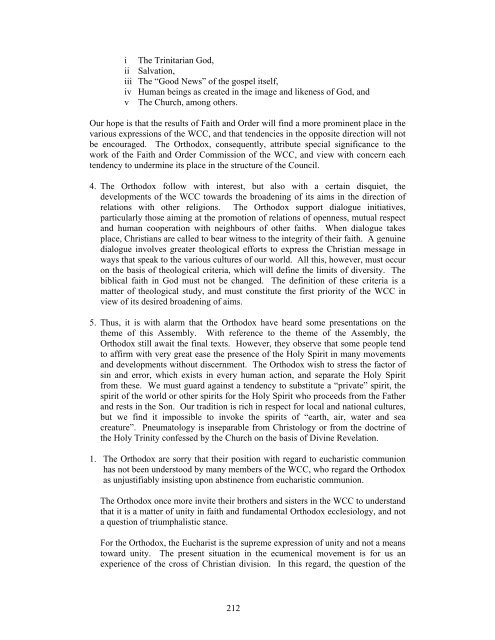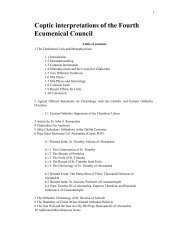Coptic Church & Ecumenical Movement - Saint Mina Coptic ...
Coptic Church & Ecumenical Movement - Saint Mina Coptic ...
Coptic Church & Ecumenical Movement - Saint Mina Coptic ...
You also want an ePaper? Increase the reach of your titles
YUMPU automatically turns print PDFs into web optimized ePapers that Google loves.
i The Trinitarian God,<br />
ii Salvation,<br />
iii The “Good News” of the gospel itself,<br />
iv Human beings as created in the image and likeness of God, and<br />
v The <strong>Church</strong>, among others.<br />
Our hope is that the results of Faith and Order will find a more prominent place in the<br />
various expressions of the WCC, and that tendencies in the opposite direction will not<br />
be encouraged. The Orthodox, consequently, attribute special significance to the<br />
work of the Faith and Order Commission of the WCC, and view with concern each<br />
tendency to undermine its place in the structure of the Council.<br />
4. The Orthodox follow with interest, but also with a certain disquiet, the<br />
developments of the WCC towards the broadening of its aims in the direction of<br />
relations with other religions. The Orthodox support dialogue initiatives,<br />
particularly those aiming at the promotion of relations of openness, mutual respect<br />
and human cooperation with neighbours of other faiths. When dialogue takes<br />
place, Christians are called to bear witness to the integrity of their faith. A genuine<br />
dialogue involves greater theological efforts to express the Christian message in<br />
ways that speak to the various cultures of our world. All this, however, must occur<br />
on the basis of theological criteria, which will define the limits of diversity. The<br />
biblical faith in God must not be changed. The definition of these criteria is a<br />
matter of theological study, and must constitute the first priority of the WCC in<br />
view of its desired broadening of aims.<br />
5. Thus, it is with alarm that the Orthodox have heard some presentations on the<br />
theme of this Assembly. With reference to the theme of the Assembly, the<br />
Orthodox still await the final texts. However, they observe that some people tend<br />
to affirm with very great ease the presence of the Holy Spirit in many movements<br />
and developments without discernment. The Orthodox wish to stress the factor of<br />
sin and error, which exists in every human action, and separate the Holy Spirit<br />
from these. We must guard against a tendency to substitute a “private” spirit, the<br />
spirit of the world or other spirits for the Holy Spirit who proceeds from the Father<br />
and rests in the Son. Our tradition is rich in respect for local and national cultures,<br />
but we find it impossible to invoke the spirits of “earth, air, water and sea<br />
creature”. Pneumatology is inseparable from Christology or from the doctrine of<br />
the Holy Trinity confessed by the <strong>Church</strong> on the basis of Divine Revelation.<br />
1. The Orthodox are sorry that their position with regard to eucharistic communion<br />
has not been understood by many members of the WCC, who regard the Orthodox<br />
as unjustifiably insisting upon abstinence from eucharistic communion.<br />
The Orthodox once more invite their brothers and sisters in the WCC to understand<br />
that it is a matter of unity in faith and fundamental Orthodox ecclesiology, and not<br />
a question of triumphalistic stance.<br />
For the Orthodox, the Eucharist is the supreme expression of unity and not a means<br />
toward unity. The present situation in the ecumenical movement is for us an<br />
experience of the cross of Christian division. In this regard, the question of the<br />
212








